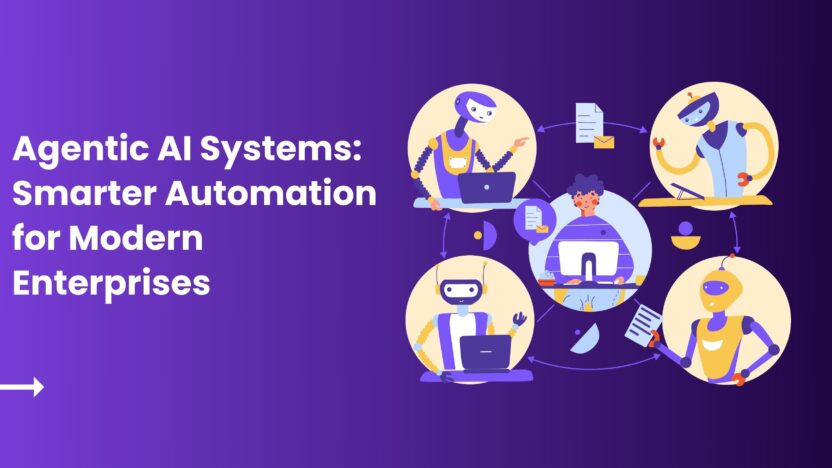Feeling under burden by repetitive workflows and slow decisions? You’re not alone. Many enterprises still juggle manual approvals, data entry, and routine checks. It drains time and energy.
Here’s something important: Agentic AI systems are changing everything. These intelligent tools don’t just follow commands, they decide what to do next. And today, approximately 54% of enterprises report improved efficiency after deploying autonomous agents, while 62% say these systems reduce errors significantly.
You don’t want just better tools. You want smarter teammates in software. That’s where Agentic AI systems, autonomous agents, and AI agent frameworks come into play. Let’s dive into what they mean, how to build them, and why they matter now more than ever.
What Are Agentic AI Systems?
First, a quick refresher. Agentic AI systems aren’t simple scripts. They act on their own. They can plan, adapt, and complete multi-step workflows without a new command every time.
They think: assess the goal, pick next steps, learn, and act. These systems blend AI planning, reasoning, and action loops. In short—they work like a teammate, not a tool.
That’s why terms like Agentic AI, autonomous agents, and AI agent frameworks are becoming essential for enterprise automation.
Why Enterprises Are Embracing Agentic AI
Let’s get real. Manual work:
- Costs time and staff
- Causes costly errors
- Delays decisions
- Makes operations harder to scale
That’s why so many enterprises now use Agentic AI systems. They handle repetitive tasks, push approvals forward, extract data, and boost speed—24/7.
When you truly embrace Agentic AI, you free people to focus on creativity, people skills, and strategy.
The Difference: Agentic AI vs Traditional Automation
Automation has been around forever. But here’s the problem: classic automation is brittle.
You build a script. It runs only one way. Change the process, and it breaks.
Agentic AI systems are different. They are flexible. They can evaluate conditions, learn from past runs, and choose next steps. They can even correct course based on outcomes.
That’s what makes autonomous agents a smarter step forward.
Building Blocks: What Makes Up an Agentic System?
When you build modern automation, you need a few key elements:
1. Task Understanding
The agent picks up goals like “process next invoice batch.” It understands broadly what that means.
2. Planning Engine
Using an AI agent framework, it plans steps like retrieve invoice, extract data, validate totals, send for signature, log status.
3. Execution Layer
This layer makes API calls, uploads, triggers emails, and integrates with other systems.
4. Feedback Loop
Results go back. The system logs outcomes. It learns and improves next time.
5. Monitoring Interface
You still stay in control. You see what’s happening, pause the agent, or fix problems.
Those parts form a full Agentic AI system.
How Autonomous Agents Work in Real Life
Here are real ways Artificial Intelligence Development Company use these systems:
A. Invoice Automation
Instead of manual uploads and validation, invoice-processing agents extract data, match with PO, route for approval, and archive documents.
B. Customer Onboarding
Once a contract is signed, agents gather data, provision access, and send welcome emails—all automatically.
C. Risk Analytics Loop
Agents review transaction data, alert risk teams when anomalies appear, and trigger follow-up actions.
D. Legacy System Connectors
Even systems from the last decade get new life when agents pull, process, and push data overnight.
Choosing the Right AI Agent Framework
When you pick tools, you want solid AI agent frameworks that:
- Offer planning and execution modules
- Support integrations via API and bots
- Track state and log everything
- Let you customize actions easily
- Provide dashboards and add humans when needed
Not all frameworks are equal. Look for ones that meet your stack and compliance needs.
Tools and Partners That Help
At the integration stage, you might want an advanced partner. In the middle of this path, many teams bring in a Flutter App Development Company to build front-end admin interfaces. They also often use Generative AI Services to create smart content generation and make the interface intuitive.
Working with an experienced artificial intelligence company here helps ensure your system is secure, reliable, and meets enterprise standards.
Measuring Success with Agentic AI
Agentic systems aren’t about change, they’re about results.
Measure things like:
- Time saved per task and aggregated
- Reduction in manual errors
- Speed of decision or approval workflows
- Cost per task before and after
- Team feedback and satisfaction
When metrics improve, you know your investment paid off.
Best Practices for Agentic AI Deployment
To build smoothly:
- Start with one high-value workflow.
- Map each step—how it works now, what breaks.
- Choose the right AI agent framework.
- Build, test, and monitor.
- Introduce human gating where risk is high.
- Scale gradually—don’t break everything at once.
- Train users as your agents evolve.
- Maintain and version agents carefully.
Common Pitfalls and How to Avoid Them
Here’s what often goes wrong—and how you can avoid them:
- Scope creep: Start small and clearly.
- Poor integration: Test each API and system link.
- Lack of oversight: Provide a control interface from day one.
- Compliance gaps: Document actions and data flow for audit.
- No iteration: Log everything and refine constantly.
What’s Next: Smarter, More Adaptive Automation
We’re heading toward agents that reason with context, predict outcomes, and self-heal. These are systems that operate with trusted logic and easy control.
To prepare, you might want continuous improvement via Machine Learning Development Services in the future.
That helps agents learn from failure, predict next best actions, and level up without manual retraining.
The Bottom Line
Agentic AI systems bring true automation for modern enterprise work. They take the grunt out of processes and let your teams do what really matters.
They are not a nice-to-have. They are becoming essential.
If you want to improve efficiency, reduce error, and scale smartly, now is the time to explore autonomous agents, AI agent frameworks, and full Agentic AI systems.
Partner with Generative AI Development Services wisely. Start small. Learn fast. Build a smarter enterprise that works like a pro.


